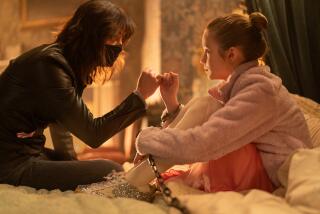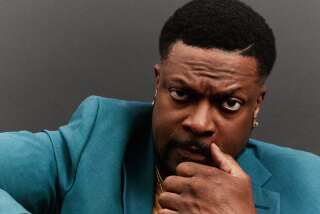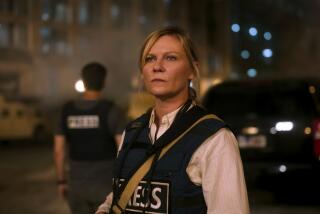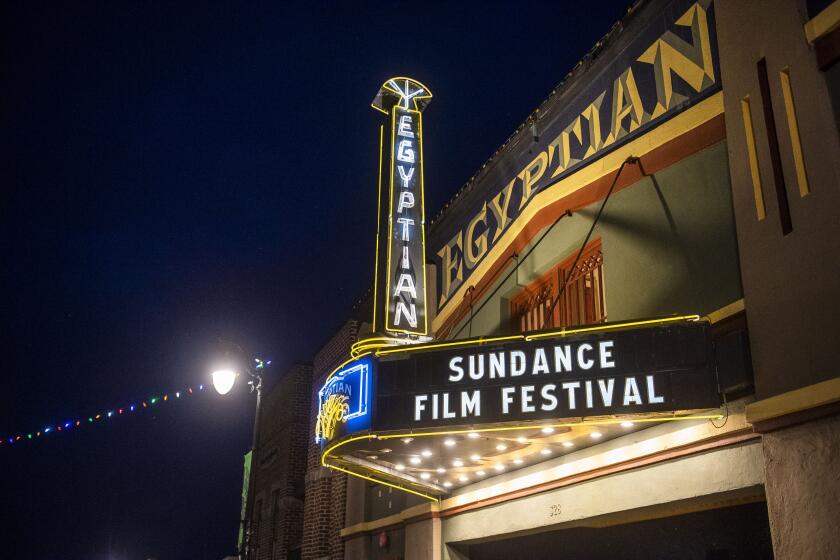Out of character
OK, so I have to admit -- it was a little disconcerting to see Sacha Baron Cohen without his “Borat” mustache.
When the lanky comedian showed up the other day for his first newspaper interview as himself since the inception of Boratmania last fall, Cohen looked a little smaller than life, especially compared with the outsized character who caused such a sensation in “Borat,” the surprise hit that managed to be something for all people, whether you laughed at Borat’s outlandish behavior -- or the people who indulged it.
Sipping a hot lemon tea at a coffee shop in Santa Monica, Cohen had the air of a man who’d shed a layer of skin that had been worn to a frazzle. With a thatch of unruly black hair and a three-day beard, wearing a rumpled corduroy jacket, the 35-year-old comic could pass for a young UCLA film professor without attracting a second glance. His thick Kazakh accent was gone, replaced by a sober British purr.
Most comics get to drop the act when the movie finishes. But for months last fall, wherever he went, Cohen arrived in full Borat drag, taking the Toronto Film Festival by storm, holding a news conference outside the Kazakh embassy in Washington and, while accepting a magazine award, praising Mel Gibson, saying, “It is you, not me, who should receive this GQ award for anti-Jew warrior of the year.”
It was brilliant marketing, with Cohen earning a tsunami of free press from news organizations that happily turned their reporters into straight men for a series of madcap interviews. In a way, he’s still at it, unveiling the real Sacha at press parties and Q&A; sessions at the height of Oscar season. His publicist first called with the idea of Cohen doing an interview -- as himself -- the day after he scored a Golden Globe nomination. Coincidence? I think not.
Still, the burden of being Borat took its toll, especially during months of filming when, to keep up the charade, he was Borat from dawn to dusk.
“It was exhausting,” he recalls, slumped in the booth, fighting off a nagging cold. “I had to be that way all day and all night, because even if the tiniest detail had gone awry, it could’ve made them suspicious. I mean, even if I went to the bathroom, I had to make sure I went to the bathroom as Borat.”
He allowed a tiny sliver of a smile. “There would definitely be potpourri in the toilet so you’d know Borat had been there.”
Cohen, via Borat, has definitely left his mark on today’s culture. In an era when entertainers have to apologize for any sort of intemperate remark, Cohen cleverly created a comic character that provided him free passage for all sorts of outrageous behavior, be it lewd remarks about women, mocking of worshipers at a Pentecostal church or a visit to a gun shop where he asked the proprietor, “What is best gun to defend against Jew?”
Having perfected this sly shtick in television doing “Da Ali G Show,” where he posed as a gold-chain encrusted hip-hop dunce, torturing a variety of government officials with wildly inappropriate questions, Cohen has become a master provocateur. Borat -- whose persona dates to “Ali G” -- seems uniquely suited to our time, even if the character has deep comedy roots. If you wanted to see a nice Jewish boy assume an ethnic identity as a way to passing himself off as a cartoonish insult artist and womanizer, you could simply watch Chico Marx in any Marx Brothers comedy.
And though nothing can top the incomparable “Ali G” sketch in which Borat gets a crowd to sing along to “Throw the Jew Down the Well” in a redneck bar, it too owes a debt to the work of Randy Newman, who would gleefully encourage similar sing-alongs to “Short People” (“They got little hands, little eyes, they walk around telling great big lies”) as if he were endorsing the song’s unsettling sentiment. Cohen’s great breakthrough is that he presents his comedy in a realistic setting -- with recognizable people, people who might live next door, as foils. It gives his bits a barbed authenticity that is often as troubling as it is funny, as when he’s with the boozy frat boys in “Borat” who complain that minorities now run America.
“ ‘Throw the Jew Down the Well’ was only interesting because the people in the bar started to sing along,” he explains. “If people had walked out, I don’t think the bit would’ve worked as well.” Some of the people Cohen and his director, Larry Charles, filmed say their actions were taken out of context, a charge Cohen vehemently denies. “If you saw all of our footage with the gun shop owner, for example, we had a whole conversation about the right gun to use to shoot a Jew’s horns off his head.”
Nonetheless, a number of people in the movie have complained or filed suit, claiming they’d been hoodwinked. Cohen isn’t exactly sympathetic. “This wasn’t ‘Candid Camera,’ ” he says. “There were two large cameras in the room. I don’t buy the argument that, ‘Oh, I wouldn’t have acted so racist or anti-Semitic if I’d known this film was being shown in America.’ That’s no excuse.”
“Borat” was produced by Jay Roach (director of the “Meet the Parents” series) who likens Cohen’s comedy technique to the work of a gifted magician. “You know it’s a contrivance and that you’re going to be fooled, but then there’s this extra layer of reality that takes you past the amazement factor and to a place where you’re not even sure that it’s a trick anymore,” he explains. “Sacha’s a real student of comedy, so he’s incredibly thorough. He never relies on his first or second idea. He wants to dig deeper. He wasn’t really happy until he got to his 28th thought for a scene.”
Born into a middle-class family in London, Cohen had early dreams of being a basketball player or a break dancer. He spent a year on a kibbutz as a teenager and was a member of Habonim, a Socialist-Zionist youth movement that he jokes “basically meant that we shared our sweets.” He was ambivalent about becoming a performer. “I think I was embarrassed to admit to my friends or myself that I wanted to be a comic -- it was sort of like admitting you wanted to be a model.”
At Cambridge he read history, spending a summer in the U.S. researching a dissertation on the prominent role Jews played in the American civil rights movement titled “The Black-Jewish Allies: A Case of Mistaking Identity.” As the title suggests, he was already fascinated by the Ali G-like notion that irony and identity play a big role in cultural differences.
“I was writing this at the time of the Crown Heights riots when the Jewish community was obsessed with black anti-Semitism,” he explains. “And I argued that this obsession came out of Jews feeling betrayed by their old blood brothers from the civil rights movement. But while it was perceived in the Jewish community that Jews were disproportionately involved in civil rights, my conclusion was black Americans didn’t see Jews as being more involved than any white Americans.
“The Jewish kids were all there in the South, but because they were there as part of church organizations like the [Southern Christian Leadership Council], they weren’t seen as Jews, but as white liberals. So there was this deep irony that the Jewish establishment took martyrs like Andrew Goodman and Michael Schwerner” -- two civil rights workers from New York who went to Mississippi to register black voters and were killed by the Ku Klux Klan -- “and used them as symbols of a Jewish-black alliance when, in fact, they didn’t really see themselves as Jews at all.”
Cohen pauses, drolly adding: “The dissertation is a lot funnier than I depicted it.”
Not long after graduating from Cambridge, Cohen found himself drawn to the early hip-hop scene in London, where he became a fan of a hip-hop DJ named Tim Westwood. “I’m sure he helped inspire Ali G,” he says. “I’d thought he was black, because he sounded like a New York gangsta, but he was actually a tall, skinny white guy who was the son of a bishop.”
Soon Cohen was creating Ali G-style sketches for TV, which also spawned the character that became Borat. A stickler for authenticity, during filming he never washed his gray Borat suit and never wore deodorant.
“The smell is an added thing for people to believe that I’m from a country where hygiene wasn’t a necessity,” he explains.
By his count, people called the police 37 times during filming, not counting the time Secret Service men showed up when he was outside the White House “figuring we must be Al Qaeda, since why else would two guys be driving around the White House in an ice cream truck?”
His closest escape came in Louisiana, when a woman whose family had once been plantation owners was insulted by a question he asked her and instructed her husband to call the police.
“We had 30 seconds to make our getaway in an ice cream truck whose top speed was 50 mph,” he recalls. I asked Cohen what he said to insult her. He furrows his brow for a moment. “I’m not sure,” he finally responds. “But I think I might have been trying to sell her some Kazakhi slaves.”
*
“The Big Picture” runs each Tuesday in Calendar. If you have questions or criticism, e-mail them to patrick.goldstein@latimes.com.
More to Read
Only good movies
Get the Indie Focus newsletter, Mark Olsen's weekly guide to the world of cinema.
You may occasionally receive promotional content from the Los Angeles Times.






